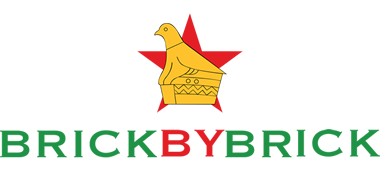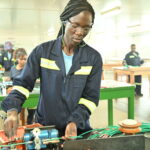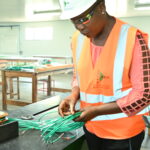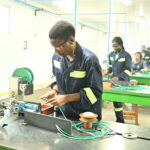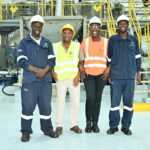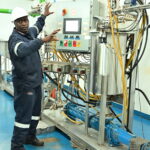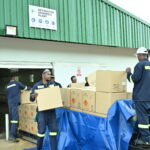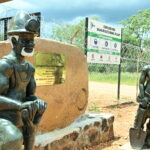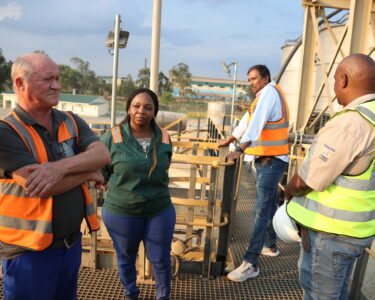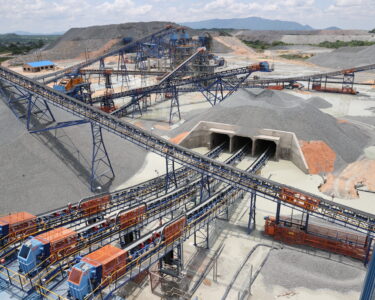Over the years, most companies, especially those in the mining sector, have found themselves importing explosives from as far afield as South America in the process putting a strain on the fiscus. However, as our reporter Elias Chakanyuka recently found out, Zimbabwe is now saving millions, thanks to Intrachem Zimbabwe, a local company, which manufactures and supplies explosives to the mining industry.
Unlike Ziscosteel, Bata Shoe Company, David Whitehead Textiles, Murowa Diamonds, ZimAlloys, Zimasco, Mimosa, etc, Intrachem is a relatively unknown quantity in the business world. Now in its fifth year of operation, Intrachem literally exploded onto the scene in 2018 and has not looked back since then.
Says project manager Luckson Gono: “Intrachem is an indigenous company which works closely with a US-based company for the purposes of technology transfer. Intrachem was formed in 2018, spurred by the need to produce emulsions locally. Most, if not all, emulsions used in Zimbabwe were imported. Intrachem was established primarily to save foreign currency as well as to create employment. For the record, Intrachem now has over 60 employees on its payroll.
“I can tell you, without a shadow of doubt, that since we started operations, we have helped the country save millions in foreign currency.
“We chose the Midlands Province, more precisely Kwekwe, for the construction of our explosives manufacturing plant because Kwekwe is at the heart of Zimbabwe. This location is ideal thanks to the good road and rail network, which makes it easy to distribute our products countrywide.
“Land clearing started around September 2019. Within 13 months, the emulsion plant was up and running. It was commissioned in November 2020, marking the end of Phase One of the project. Phase Two saw the construction of the detonator plant, which was officially opened by President Mnangagwa last year.
“To date, about US$7,8 million has been invested into the project. As you can see for yourselves, this is a state-of-the-art plant built according to international standards. We are now working on Phase Three of the project which entails the construction of a cartridge plant.
Speaking after touring Intrachem and another Kwekwe giant, Dendairy, in July last year, President Mnangagwa praised young Zimbabweans who had heeded government’s industrialisation and modernisation call.
“We are extremely excited and what makes us happy as government is the response we are getting from our people, especially the younger generation. The companies are embracing the concept of science and technology and innovation in enhancing government’s vision.
“I believe that the younger generation has so much talent to develop their nation. In another five to 10 years from now, Zimbabwe will be totally different and it will be at the apex. I do not know which country will compete with us at the speed at which we are developing,” President Mnangagwa was quoted as saying then.
With a track record spanning over 30 years in the mining industry, Gono has seen it all, but he is the first to admit all is not rosy. “We are doing very well, but we need all the support we can get from government because we are facing stiff competition from foreign companies. We are asking for duty-free ammonium nitrate and sodium nitrate imports. These are our major raw materials. If we pay duty for these materials, over and above our production costs, our prices will be rendered sky-high and it will be very difficult for us to compete with foreign suppliers.
“Despite the stiff competition, we are here to stay and we are planning to manufacture all types of explosives locally. There is a lucrative market for explosives in the mining industry, both here and in other countries. However, our goal is to satisfy the local market first before venturing into the export market,” says Gono.
During his tour of Intrachem, President Mnangagwa pledged to assist the company achieve its objectives, saying: “I think in future we need to look into it [helping Intrachem] through the Ministry of Industry and Commerce. The new company that has come in is predominantly run by young engineers from this country who are responding to the Second Republic’s call for value addition and producing services and good for our needs.
“That feeds into our vision to industrialise and modernise our economy. I was so pleased that these young men who were working in South Africa decided to come back because of the environment we have created. They [not only] set up a factory worth US$7 million but they are also expanding.
“They are saying the market is huge, they are unable to satisfy it. They are also covering countries like the Democratic Republic of Congo and Zambia in terms of their export market. We have told them that we will do our best as government to support them to expand.”
With such a seal of approval from the country’s highest office, even the sky is not the limit for Intrachem as it rolls out its expansion drive.
The Intrachem detonator assembly manager is one Owen Calvin Mukomba, who retraced his footsteps to the motherland in 2022 after spending 14 years in South Africa, where he was employed by Sasol. Despite the mouthwatering salary and perks, Mukomba had a dream that “big things were happening in Zimbabwe” under the Second Republic and decided to pack his bags headed for home.
Says Mukomba: “I have been in the explosives industry for more than 35 years. In 2009, I was hired by Sasol in South Africa where I worked in the detonator assembly plant. Last year (2022), Intrachem headhunted me for a job back home. After the mandatory interview followed by salary negotiations, I took up the offer. I decided to come back home because there is no place like home. It’s trite but true to say that home is best.
“The grass always looks greener on the other side. People tell us all sorts of nice stories about how good it is to be away from home. Yes, for a while it can be good but, remember, home is home. Nothing will ever beat home. I am a Zimbabwean, first and foremost, and Zimbabwe is where I belong.
“Looking at what is currently happening in Zimbabwe right now, as a Zimbabwean, as a patriot, you also feel why not come and utilise your expertise, knowledge and experience to benefit your country rather than do it for some foreign country?
“It’s a fact that things are happening in Zimbabwe in terms of development. There is a big change. The best that one can do is to support that change. To illustrate my point, some years ago, whenever I drove back home from South Africa, our Beitbridge Border Post was a depressing sight. It looked more like a growth point than a border post.
“When I came back home to join Intrachem, I drove through the Beitbridge Border Post and I was amazed by what I saw. You need to go to the border post to appreciate what I am talking about. The refurbishment at the border post is mind-blowing. It’s so, so refreshing and it makes you proud to be Zimbabwean. It now meets international standards. The same goes for the Harare-Beitbridge highway. You can clearly see the hand of a progressive government at work. I definitely want to be part of this development,” says Mukomba.
Turning to Intrachem’s operations, Mukomba had this to say: “In the past, most local companies were buying detonators from Peru and reselling them to the mining industry. Now we import the components from Peru and assemble detonators here. This has gone a long way in reducing their price.
“Detonators are in high demand, and we failing to satisfy the market. In a bid to cope with growing demand, we recently introduced a third shift to increase production. Although meeting local demand is our first priority, we are eyeing the export market, across the region and beyond, in the long term.
“Due to the nature of our work here, I cannot emphasise enough the importance of safety. We have in-built systems to ensure that our workers are protected from fatal accidents. We undertake periodic pre-task risk assessments to ensure maximum safety for all our employees. So far we have not experienced any unfortunate incident or accident and I don’t anticipate any such mishaps here.”
To buttress his point, Mukomba took the Brick by Brick magazine team on a tour of the magazine or warehouse where Intrachem stores its explosives. The “bunker-like” facility is one of the best in the country, Mukomba assured us.
“It’s very rare to see a magazine like this one. As you may probably be aware, magazine specifications are prescribed by law. This is a very modern – and rare – magazine, which you are likely to find in only a few select countries, notably South Africa, where I worked before.
“In Zimbabwe, this is probably the only magazine you will ever see with light bulbs because most operate under natural light. However, we convinced the regulatory authorities on the need to install solar lights in our magazines since the risk of accidental explosion is minimal. We have two such magazines, each with a capacity to store 7 000 boxes,” said Mukomba as he handed over the Brick by Brick team to the site administration manager at the Kwekwe plant, Mercy Chijekwere.
A woman who is at home with explosives is something straight out of a science-fiction movie, or so we thought. But this was a real-life movie, not fiction, and Mercy Chijekwere was on hand to explain to us what it takes to manufacture detonators.
Over to Mercy: “In this detonator plant, we assemble detonators using the safety fuses. Each shift is comprised of seven plant operators, each of whom is expected to produce 2 500 units by end of the shift, giving a total of 17 500 units.
“Our customers are mostly small-scale and artisanal miners.
“We assemble two types of detonators — the 0,9-metre and 1,2-metre detonators. We are quite happy that most of the plant operators are meeting their daily targets. But it’s not just the shift figures we are interested in. We cannot afford to compromise on quality because of the stiff competition we face. We do weekly quality tests by measuring the burning speed of our detonators. So far so good. Our customers, who are mostly small-scale and artisanal miners, are extremely happy. According to their feedback, our detonators are much better than those imported from Peru.
“I am happy to say Intrachem is an equal opportunity employer. There is a temptation to believe that the explosives industry is a male domain. But we are giving 50-50 opportunities to the girl child so that she can demonstrate her potential. We have been vindicated because some of the girls are outperforming the boys.
“Furthermore. Intrachem does not put too much emphasis on academic qualifications. As long as the job applicants are physically fit, we invite them for an interview. If successful, they will undergo rigorous training after which they will be deployed to their respective workstations,” explains Chijekwere.
Apart from detonators, Intrachem also manufactures emulsions for the large mining companies like Freda Rebecca Mine. “Like the detonators, the emulsions come in two types — underground and surface. The underground emulsions naturally consume more raw materials as they have more explosive power than surface emulsions,” says Chijekwere, who appears to be at home with a detonator in her hand as she is with her make-up kit.

